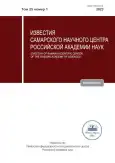Configuration of a resource-saving electronic equipment circulation system in order to create a safe living environment
- Authors: Tshovrebov E.S.1, Niyazgulov F.K.2
-
Affiliations:
- FSBI Research Institute of Emergency Situations (FC)
- Russian University of Transport (RUT MIIT)
- Issue: Vol 25, No 1 (2023)
- Pages: 107-116
- Section: Articles
- URL: https://journals.eco-vector.com/1990-5378/article/view/624579
- DOI: https://doi.org/10.37313/1990-5378-2023-25-1-107-116
- ID: 624579
Cite item
Full Text
Abstract
The purpose of this work was to create a configuration of a resource-saving system for handling used household and electronic equipment that implements the state of environmental safety of territories, the formation of a comfortable, safe, favorable environment for people's life, the protection of the population and territories from possible threats of man-made and natural emergencies. The main objectives of the conducted research are defined:collection, generalization, systematization of materials, composition of research results in the field of methods, methods, technologies for collecting, sorting, processing electronic scrap; comparative analysis of the component composition of electronic and household appliances, devices, installations, automation and measurement equipment that have completed their service life; system analysis of methods and technologies that ensure maximum extraction of useful components from electronic waste for their reuse as secondary raw materials in economic turnover; development of the configuration of the organizational and technical system and technological infrastructure of the entire cycle of waste management of electronic and electrical equipment, implementing ensuring the state of protection of people, the natural environment from the negative effects of hazardous technosphere objects, the favorable and comfortable living environment of citizens.The results of the conducted research can be used in the development and updating of territorial waste management schemes, territorial and sectoral schemes for planning waste processing infrastructure, industrial and technical complexes for collecting, accumulating, and processing these specific wastes.
Full Text
Tskhovrebov E.S., Lebin A.N., Belousov V.G. Noveyshaya istoriya razvitiya prirodookhrannoy deyatel'nosti v Rossii // Vestnik Kostromskogo gosudarstvennogo universiteta im. N.A. Nekrasova. 2012. T. 18. № 2. S. 192-196. EDN: PYNRCD
Tskhovrebov E.S.,Niyazgulov F.Kh. Otsenka urovnya ekologicheskoy bezopasnosti regionov na osnove nechetkikh pokazateley // Izvestiya Samarskogo nauchnogo tsentra Rossiyskoy akademii nauk.2022. T. 24.№ 5 (109). S. 60-68.
Tskhovrebov E., Velichko E., Niyazgulov U. Planning measures for environmentally safe handling with extremely and highly hazardous wastes in industrial, building and transport complex. Materials Science Forum. 2019. T. 945. Pp. 988-994.
Suzdaleva A.L. Ekologicheskaya globalistika i ustoychivoe razvitie na etape tekhnogennoy transformatsii biosfery // Geoekologiya. inzhenernaya geologiya. gidrogeologiya. Geokriologiya. 2020. № 1. S. 6-11. EDN: HKJMPL
Rudakova L.V.,Chugaynova A.A.Analiz tekhnologiy utilizatsii elektronnykh otkhodov // Materialy dokladov Mezhdunarodnoy nauchno-tekhnicheskoy konferentsii "Innovatsionnye puti resheniya aktual'nykh problem prirodopol'zovaniya i zashchity okruzhayushchey sredy". Tom III. Belgorod. 2018. S. 125-131. EDN: MHHOGD
Gofman V.R., Popov A.A. K voprosu ob upravlenii otkhodami potrebleniya elektronnoy tekhniki v sisteme ekologicheskogo menedzhmenta v Rossiyskoy Federatsii // Vestnik Yuzhno-ural'skogo gos.un-ta. 2010. № 11. S. 44-51.
Akaev O., Voynarovskaya A., Zhelyaznyy S., Zhukovskiy V. Termicheskaya pererabotka otkhodov elektronnoy promyshlennosti // Vestnik Kostromskogo gosudarstvennogo universiteta im. N.A. Nekrasova. 2012. T. 18. № 2. S. 8-10. EDN: PYNQID
XianlaiZeng, John A. Mathews, and Jinhui Li. Urban Mining of E-Waste is Becoming More Cost-Effective Than Virgin Mining // Environmental Science & Technology. Publication Date (Web): April 4, 2018 (Article).Rr. 121-125.
Mehmet Ali Kücüker, Jean-Baptiste Nadal, Kerstin Kuchta.Comparison between batch and continuous reactor systems for biosorption of neodymium (nd) using microalgae // International journal of plant, animal and environmental sciences. 2016. Rr. 197-203.
Baldé C.P., Forti V., Gray V., Kuehr R., Stegmann P. The Global E-waste Monitor - 2017 // United Nations University (UNU), International Telecommunication Union (ITU) & International Solid Waste Association (ISWA), Bonn/Geneva/Vienna. 2017. 53 r.
Ladygin K.V. Stompel' S.I., Spektor Yu.L. Pererabotka elektronnogo loma po tekhnologii termicheskoy destruktsii // TBO. 2018. № 6. S. 30-31. EDN: XYYDED
Kirchherr J., Reike D., Hekkert M. Conceptualizing the circular economy: An analysisof114definitions.Resources,Conservation&Recycling.2017.No 127.R.9.
Hart, J., Adams, K. and others. Barriers and drivers in a circular economy: the case of the built environment. Procedia CIRP. 2019. No 80. Pp. 619-624.
Domenech T., Bahn-Walkowiak B. Transition Towards a Resource Efficient Circular Economy in Europe: Policy Lessons from the EU and the Member States, Ecological Economics, 2019. Vol.155. Pp 7-19.
Ehresman T., Okereke C. Environmental justice and conceptions of the green economy International Environmental Agreements: Politics, Law & Economic, 2015. Vol. 15. Iss. 1. Pr. 13-27.
Hertwich E., Lifset R., Pauliuk S., Heeren N. Resource Efficiency and Climate Change: Material Efficiency Strategies for a Low-Carbon Future. A Report of the Int. Resource Panel. United Nations Environment Programme, Kenya. 2020, https://www.unep.org/resources/report/resource-efficiency-and-climate-change-material-efficiency-strategies-low- carbon.
Goldstein B., Rasmussen F. LCA of Buildings and the Built Environment. Life Cycle Assessment. Theory and Practice. 2018. Chapter 28. Pp. 695-720.
Bartoleto A. Waste prevention policy and behaviour. New approaches to reducing waste generation and its environmental impacts. Routledge studies in waste management and policy. L., N.Y.: Routledge. 2015. P. 30.
Robin Murray. Zero waste. Greenpeace Environmental Trust. 2002. 211 r.
Elgizawy S., El-Haggar S., Nassar K. Slum Development Using Zero Waste Concepts: Construction Waste Case Study. ProcediaEngineering. Vol. 145. 2016. Pp. 1306-1313.
About the authors
Eduard S. Tshovrebov
FSBI Research Institute of Emergency Situations (FC)
Author for correspondence.
Email: rebrovstanislav@rambler.ru
Candidate of Economic Sciences, Associate Professor, Senior Researcher at the Center of the Research Institute of the Ministry of Emergency Situations of Russia
Russian Federation, MoscowFilyuz Kh. Niyazgulov
Russian University of Transport (RUT MIIT)
Email: transgeo@yandex.ru
Adyunkt, Russian university of transport (RUT MIIT)
References
Supplementary files






